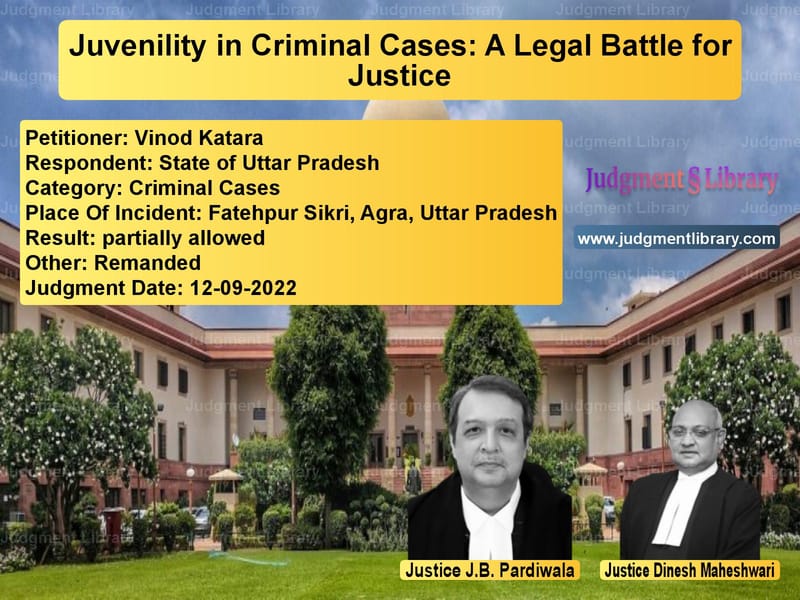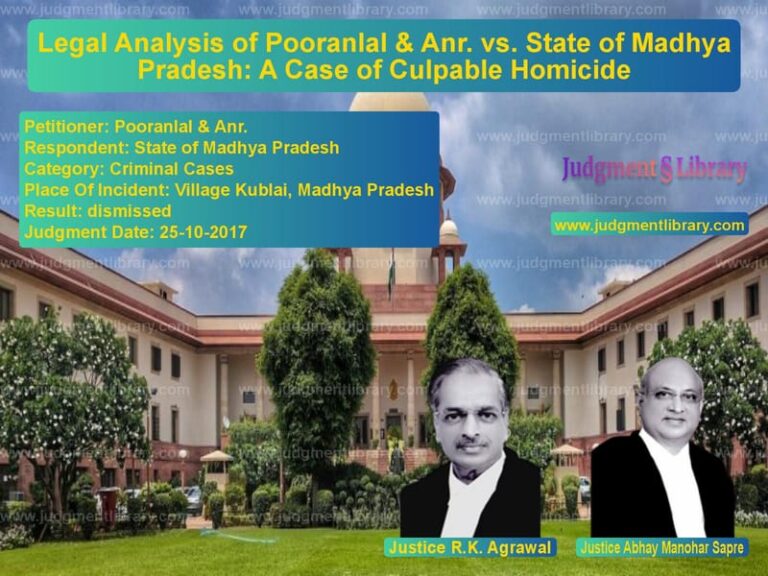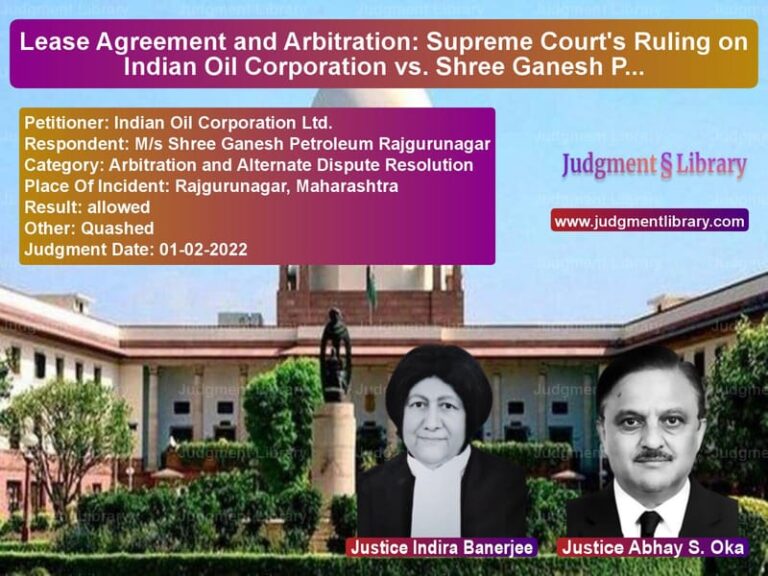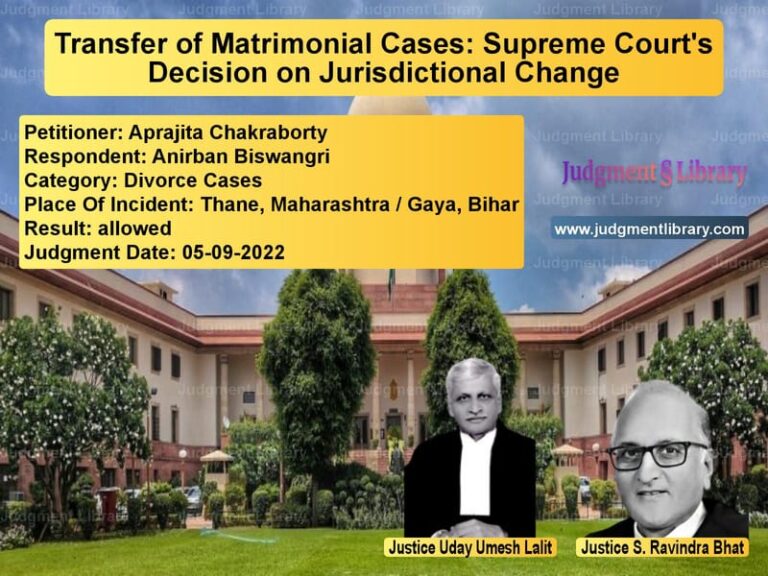Juvenility in Criminal Cases: A Legal Battle for Justice
The legal principle of personal liberty is among the oldest recognized by national courts. The English Magna Carta, as far back as 1215, stated that ‘No free man shall be taken or imprisoned… but by the law of the land.’ In India, the legal framework for protecting personal liberty has evolved, particularly concerning juveniles in conflict with the law.
This case brings forth an important question: Can an individual convicted decades ago raise a claim of juvenility and seek legal relief under the contemporary juvenile justice framework? The Supreme Court was called upon to decide this question in the case of Vinod Katara v. State of Uttar Pradesh.
Background of the Case
The petitioner, Vinod Katara, was convicted of murder under Section 302 read with Section 34 of the Indian Penal Code (IPC). The Sessions Court in Agra sentenced him to life imprisonment in 1986. Dissatisfied with the conviction, he appealed to the Allahabad High Court, which upheld the trial court’s verdict in 2016. His subsequent Special Leave Petition (SLP) to the Supreme Court was dismissed in 2016.
Read also: https://judgmentlibrary.com/supreme-court-acquits-two-trade-union-leaders-in-assam-murder-case/
However, post-conviction, the petitioner raised a crucial claim: at the time of the offense in 1982, he was a juvenile and therefore ineligible for trial under regular criminal law. The petitioner’s plea for reconsideration rested on the argument that juvenility claims could be raised at any stage, including post-conviction.
Legal Issues Raised
- Can a claim of juvenility be raised decades after conviction?
- How should courts verify age in the absence of school records or birth certificates?
- Does an ossification test provide conclusive evidence of age?
Petitioner’s Arguments
The petitioner’s counsel, Mr. Rishi Malhotra, argued that juvenility claims could be raised at any time under the Juvenile Justice (Care and Protection of Children) Act, 2000, as amended in 2011. He relied on a medical report and a Family Register certificate, both indicating that the petitioner was around 15 years old at the time of the offense.
He cited Abuzar Hossain v. State of West Bengal (2012), where the Supreme Court held that juvenility claims could be entertained at any stage, even after final disposal.
Additionally, he contended that since the Juvenile Justice Act had been enacted to provide reformative justice, its provisions should be interpreted liberally in favor of the accused.
State’s Counterarguments
The State of Uttar Pradesh, represented by Mr. Ardhendhumauli Kr. Prasad, opposed the claim on several grounds:
- The Family Register was not a legally admissible document for age verification.
- The petitioner had not submitted any school records or municipal birth certificates.
- There was no contemporary medical examination conducted at the time of the trial.
The State further argued that allowing such claims decades after conviction would open floodgates for similar petitions, causing legal uncertainty.
Supreme Court’s Observations
The Court, led by Justice J.B. Pardiwala, examined the applicability of juvenile justice laws. It noted the following:
- Section 7A of the Juvenile Justice Act permits juvenility claims at any stage.
- Age determination should follow a hierarchical order: matriculation certificate, school records, birth certificate, and, in their absence, medical examination.
- Ossification tests have limitations, especially when conducted decades after the alleged offense.
Analysis of Juvenility Laws
The Court extensively reviewed precedents, including:
- Pratap Singh v. State of Jharkhand (2005), which clarified that the benefit of juvenility applies to pending cases.
- Dharambir v. State (NCT of Delhi) (2010), which allowed juvenility claims even post-conviction.
- Kalu v. State of Haryana (2012), which emphasized the procedural safeguards for juvenility determination.
The Court also noted that while medical tests could be used in the absence of other records, their reliability decreases as age advances.
Final Directions
The Supreme Court issued the following orders:
- The Sessions Court in Agra was directed to verify the authenticity of the Family Register.
- The petitioner was to undergo an ossification test at a government hospital.
- A detailed report was to be submitted within one month.
Conclusion
This judgment highlights the evolving nature of juvenile justice in India. The Court’s cautious approach ensures that legal safeguards are maintained while preventing potential misuse of the law. The final decision will depend on the Sessions Court’s findings, which will determine whether the petitioner is entitled to relief under juvenile justice provisions.
Read also: https://judgmentlibrary.com/supreme-court-modifies-sentence-in-maharashtra-assault-case/
Petitioner Name: Vinod Katara.Respondent Name: State of Uttar Pradesh.Judgment By: Justice J.B. Pardiwala, Justice Dinesh Maheshwari.Place Of Incident: Fatehpur Sikri, Agra, Uttar Pradesh.Judgment Date: 12-09-2022.
Don’t miss out on the full details! Download the complete judgment in PDF format below and gain valuable insights instantly!
Download Judgment: vinod-katara-vs-state-of-uttar-prade-supreme-court-of-india-judgment-dated-12-09-2022.pdf
Directly Download Judgment: Directly download this Judgment
See all petitions in Juvenile Justice
See all petitions in Bail and Anticipatory Bail
See all petitions in Judgment by J.B. Pardiwala
See all petitions in Judgment by Dinesh Maheshwari
See all petitions in partially allowed
See all petitions in Remanded
See all petitions in supreme court of India judgments September 2022
See all petitions in 2022 judgments
See all posts in Criminal Cases Category
See all allowed petitions in Criminal Cases Category
See all Dismissed petitions in Criminal Cases Category
See all partially allowed petitions in Criminal Cases Category







